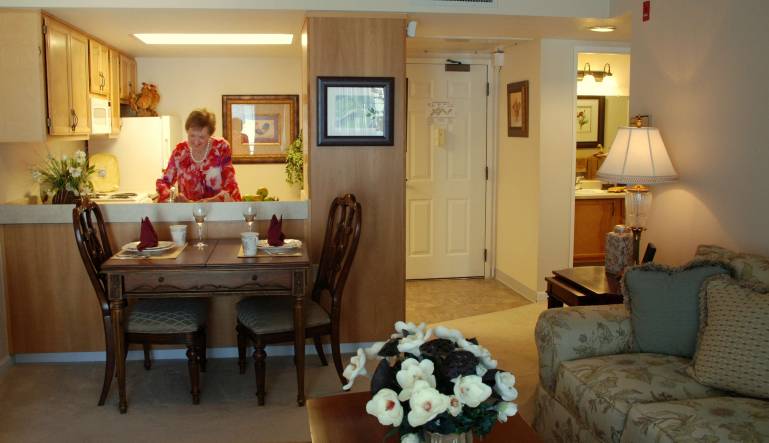The kitchen is often the hub of a home, and that is true for seniors too. Besides baking and cooking it’s the room where many of us read, create craft projects, pay bills, and more. But kitchens can also be places where safety issues hide. From slip and fall accidents to fires, older adults need to be aware of potential dangers and take the necessary precautions.
Conducting a kitchen safety audit to identify and correct problems is one step adult children can take to keep an older parent safe.
Kitchen Safety Checklist for Seniors and Caregivers
The first step is to assess the room for potential fire hazards and other general risks:
- Remove any dish towels hanging on oven handles or on the wall over a stove top where they can brush against burners and ignite.
- Keep potholders and plastic utensils away from burners on the stove top. Likewise, check the length of curtains near the stove to make sure they can’t brush against burners either.
- Talk with your senior loved one about safe clothing choices while they are cooking. Specifically, encourage them to wear short sleeves or roll their sleeves up when cooking to prevent them from falling against a flame or oven coil and igniting.
- Dirty kitchen ventilation systems are a common source of kitchen fires. Be sure the one in your older family member’s kitchen is cleaned regularly.
- Make certain there is a working smoke detector installed near the kitchen. One that sounds an alert for both flames and smoke is best.
- Store an easy-to-operate fire extinguisher in the kitchen and review the instructions for operating it together.
- Remind your parent not to leave pans simmering on the stove without setting a timer. It’s too easy to walk away and forget something is cooking.
- Good lighting over the stove and countertop area is also important for preventing fires and injuries related to food preparation.
- Keep knives, kitchen shears, and other sharp utensils safely stored.
Food Safety for Older Adults
Another issue that is important not to overlook is food storage. Here are a few tips you can use when evaluating a senior loved one’s kitchen:
- Make sure the refrigerator is set to 40 degrees Fahrenheit to keep meats, dairy, and other perishables safe.
- Encourage your family member to use a permanent marker to write the purchase date on anything they store in the refrigerator that doesn’t have an expiration date on the label.
- If you are concerned your senior family member is a little forgetful, installing an automatic shut-off feature on a gas range or utilizing a product such as Cook Stop to monitor activity in the kitchen can help. These devices turn the burner off if no movement is detected in the kitchen for a pre-determined amount of time.
Preventing a Senior from Experiencing a Fall in the Kitchen
Slip and fall accidents in the kitchen can lead to serious injuries among seniors. Here are a few steps you can take to lower their risk:
- Tile flooring can present a fall risk for older adults who are bare foot or wearing slippery soled shoes. Remind the senior to wear skid-free slippers or shoes in the kitchen.
- Arrange kitchen cupboards so that frequently used food items are stored in areas that are easiest to reach. That prevents the senior from needing to use a step stool or ladder.
- Invest in unbreakable dinnerware to avoid injuries caused by broken glass.
- Install motion-sensitive night lights along the path the senior takes to the kitchen at night. This is another step that can help lower their risk for a fall.
- Place a non-skid mat or rug in front of the sink. It can soak up spills and prevent water from ending up on the floor and creating a fall hazard.
Senior Living Communities Offer Safe Options
If the burden of keeping yourself or your loved one safe in the kitchen and home in general is becoming too much, it may be time to transition to a senior living community. Five Star Senior Living communities provide a comprehensive sense of security that goes beyond just physical safety. Find a community near you to learn more.
Contact Us Today
"*" indicates required fields

